► Our guide to the best new plug-in hybrid SUVs available in 2024
► New plug-in hybrid SUVs that offer useful electric range
► Go plug-in to benefit from reduced costs and increased flexibility
Electric SUVs are becoming more accessible, numerous and accomplished, but many buyers may still be better served by a hybrid car – or more specifically a plug-in hybrid SUV instead. The eco credentials of the best plug-in SUVs are not as outstanding, of course, but their ease of use and blend of capabilities can make them easier to live with.
The best plug-in SUVs combine all the plus points and practicalities of larger cars, but combine them with thriftiness that’d leave a traditionally ICE-powered city car in the dust. Compared to an all-electric SUV, plug-in hybrid SUVs also aren’t entirely reliant on electric power – so you don’t necessarily have to plan longer journeys around charing points.
The best plug-in hybrids at a glance
There’s a good range of plug-in hybrid electric vehicles – PHEVs – available in the SUV sector, too, ranging from those focused on practicality to those aimed more at performance and driver enjoyment. To help expedite your search for, and to help you make a good buying decision, here are 10 of the best new plug-in hybrid SUVs available now.
The best plug-in hybrid SUVs available in 2024
BMW X5 xDrive50e
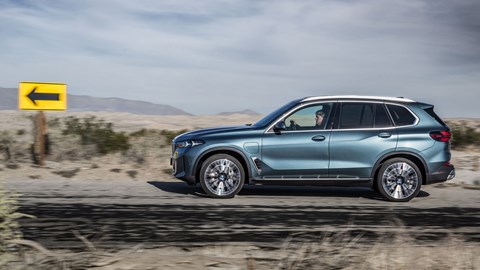
Best for: Those seeking a premium SUV that balances performance, technology, and luxury
Pros: Dynamic driving experience, a range of powerful engines, and a well-sorted chassis
Cons: Interior and exterior designs might feel dated to some
There’s a host of tempting BMW plug-in hybrids on offer, including a version of its 5 Series Touring that’ll do 35 miles on electric power alone. Arguably, this is what most should aim for; estates weigh less, are better to drive, garner fewer unpleasant glances, and tend to be more practical as well.
There are often advantages to an SUV, though, such as easier ingress and improved rough-road capabilities. And if you’re set on an SUV, and want something capable and gratifying, BMW’s X5 xDrive50e should be at the top of your list. It’s just replaced the excellent X5 xDrive45e but offers more power and more electric range. It’ll do up to 67 miles on electric power alone and its powertrain delivers up to 482bhp, which propels it from 0-62mph in just 4.8 seconds.
Read the full BMW X5 review
Range Rover PHEV
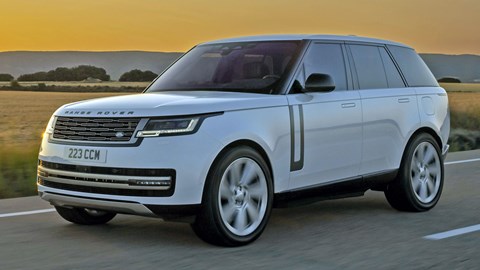
Best for: Those who want on-road comfort, off-road capability and cutting-edge technology.
Pros: Luxury, comfort, and off-road prowess
Cons: Significant weight penalty
If you simply must have the most comfortable plug-in hybrid SUV around, and money is no object, go for a new Range Rover. The refinement offered is outstanding, the design sublime, and it’s still remarkably capable in off-road situations. And, despite its weight and size, it’s quick; even the standard plug-in hybrid P440e model is capable of 0-62mph in 6.0 seconds.
More significantly, thanks to a large battery, both the P440e and higher-performance P510e will cover around 70 miles on electric power alone. And, once that battery is spent, you can rely on the Range Rover’s smooth six-cylinder petrol engine to keep you moving for as long as it’s got fuel. Want something a bit more rugged? Look at the Land Rover Defender P400e plug-in hybrid instead.
Read the full Range Rover review
Toyota RAV4 Plug-in Hybrid
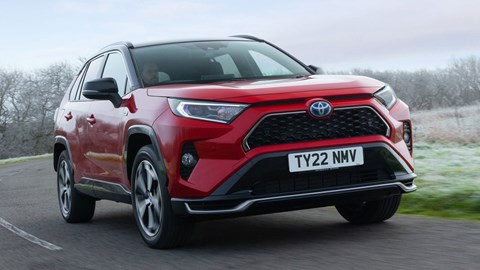
Best for: Those seeking safety and efficiency.
Pros: Practicality, efficiency, and a plethora of safety features
Cons: Powertrain feels unpolished, design might not appeal to everyone
Buying a plug-in hybrid can often be the result of a pragmatic approach to purchasing a new car. And, if you’re being pragmatic about things, you’ll probably spend a lot of time contemplating manufacturer warranties. Buying a new car is not much fun if you’re forever fretting about it breaking down or wondering what it’ll be like to live with in the future, after all.
If you’re looking to keep fuss to a minimum, a new RAV4 Plug-in Hybrid could be ideal because Toyota now offers up to ten years or 100,000 miles of warranty cover. The RAV4 is also inexpensive to run, comes with lots of standard equipment, is roomy, and it’s easy to drive. All in, it should be a doddle to own and pleasant to live with. It’s surprisingly quick, too; it packs a combined 302bhp and all-wheel drive, and can sprint from 0-62mph in six seconds.
Read the full Toyota RAV4 Hybrid review
Porsche Cayenne E-Hybrid
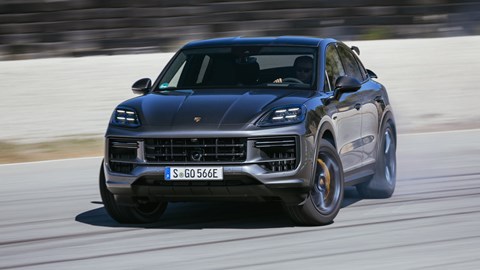
Best for: Monster performance with a chunky electric-only range
Pros: Awesome to drive, luxurious inside, very powerful
Cons: Still won’t be cheap to run, loses some boot space
Porsche now offers three E-Hybrid variants of the Cayenne SUV and the Cayenne Coupe. Each features a 174bhp / 330lb ft electric motor and a usefully large 25.9kWh battery pack, which means up to 48 miles of electric-only driving range is possible according to the WLTP figures. What’s more, a new generation of energy recuperation technology makes it easier to maintain the availability of that battery capacity while you drive. So far, so eco.
Being Porsche, these plug-in hybrid SUVs also push the performance envelope. There are a couple of V6 options (463bhp or 512bhp) but it’s the V8-powered Turbo E-Hybrid that really crushes the entire opposition. This has 729bhp, can reach 190mph and does 0-62mph in as little as 3.6sec (in Coupe GT Package guise). More significantly still, they’re all sensational to drive, with remarkable agility and refined comfort thanks to some exceedingly clever chassis technology. If you like to drive, go for one of these.
Read the full Porsche Cayenne E-Hybrid review
Mercedes-Benz GLC 300e Plug-in Hybrid
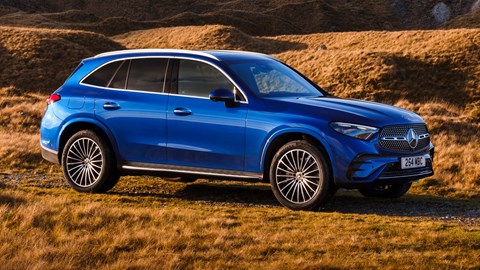
Best for: those who want a little more glamour to their PHEV
Pros: Decently spacious inside, quick acceleration, relatively understated
Cons: Not especially pleasant to drive
Okay, so we may not be hugely fond of the regular petrol GLC, but the plug-in hybrid is at least efficient, offers decent E-only range according to the figures – though we’re yet to test it – and presents a slightly swankier alternative to some otherwise anodyne examples.
There’s plenty of room inside, while not too flashy – there’s an understatement to the GLC, which can’t be said for the rest of the Mercedes line up. It’s nippy too – able to reach 62mph in under six seconds, and with smooth low-down shove thanks to the electric motor.
Volvo XC60 Recharge
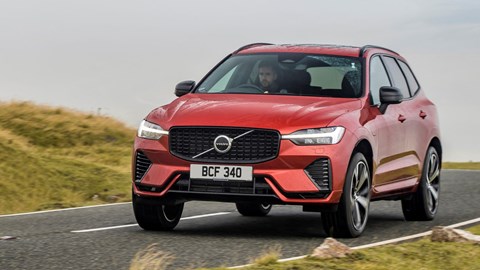
Best for: Those seeking a luxury hybrid SUV with a cutting-edge safety and good performance
Pros: Impressive power, fuel efficiency, and a smooth transition between drive modes
Cons: Ride quality can be inconsistent, braking system feels overly sensitive
Your first port of call, if you’re looking for a luxury SUV, might well be the highly regarded and long-standing Volvo XC90 – the plug-in version of which is called the Recharge. However, unless you need seven seats, you might as well save yourself a chunk of change and go for the XC60 Recharge instead.
It’s no slouch, that’s for sure, with even the entry-level 345bhp T6 powertrain option allowing it to dispatch the 0-62mph sprint in 5.4 seconds. Go for the 449bhp T8 and that time drops to just 4.6 seconds. Either, though, delivers an impressive all-electric range of 47.8 miles. The polished interior and space on offer, and its relaxing nature, only add to its appeal.
Read the full Volvo XC60 hybrid T8 Twin Engine review
Skoda Kodiaq Plug-in Hybrid
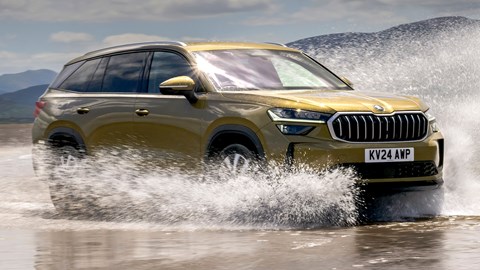
Best for: Those seeking space and comfort without busting the bank
Pros: Lots of space, nicely trimmed interior, good value
Cons: Ride not as good as it once was
We’re big fans of the Skoda Kodiaq, by virtue of its roominess and how easy it is to live with. It may not have some of the glitz nor opulence of other examples on this list, but it’s highly refined, drives well and feels primed for family life.
According to the official figures, it also has a maximum electric range of 60 miles from a 25.7kWh battery, which isn’t bad at all. It’s also one of the more affordable options on this list, as plug-in models start from around £42,000.
Read the full Skoda Kodiaq plug-in hybrid review
Lexus NX 450h+
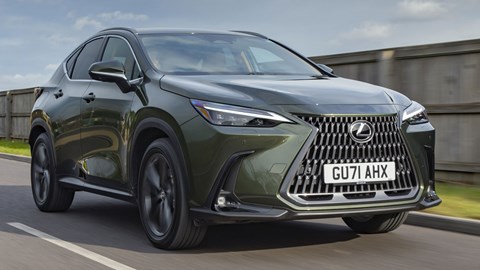
Best for: Those who want a luxurious hybrid SUV with a focus on comfort and technology
Pros: Comfortable drive, upgraded infotainment system, impressive hybrid efficiency
Cons: Regular hybrid can feel underpowered
When you want comfort and refinement, or just if the conventional options aren’t grabbing your attention, it’s worth looking to Lexus. Its plug-in hybrid NX 450h+, for example, offers up a relaxing and neatly finished interior, and its ride quality is very good – especially if you opt for variants with the adaptive dampers.
Lexus has stacks of experience with hybrid powertrains, too, which shows in the capable way the NX performs; its 2.5-litre petrol engine and motors put out a combined 304bhp and it’ll dash from 0-62mph in 6.3 seconds, while its 18.1kWh battery also permits a range of some 40 miles. Those wanting more in terms of driver engagement and fun, though, should look elsewhere.
Read the full Lexus NX (2024) review
Hyundai Santa Fe Plug-in Hybrid
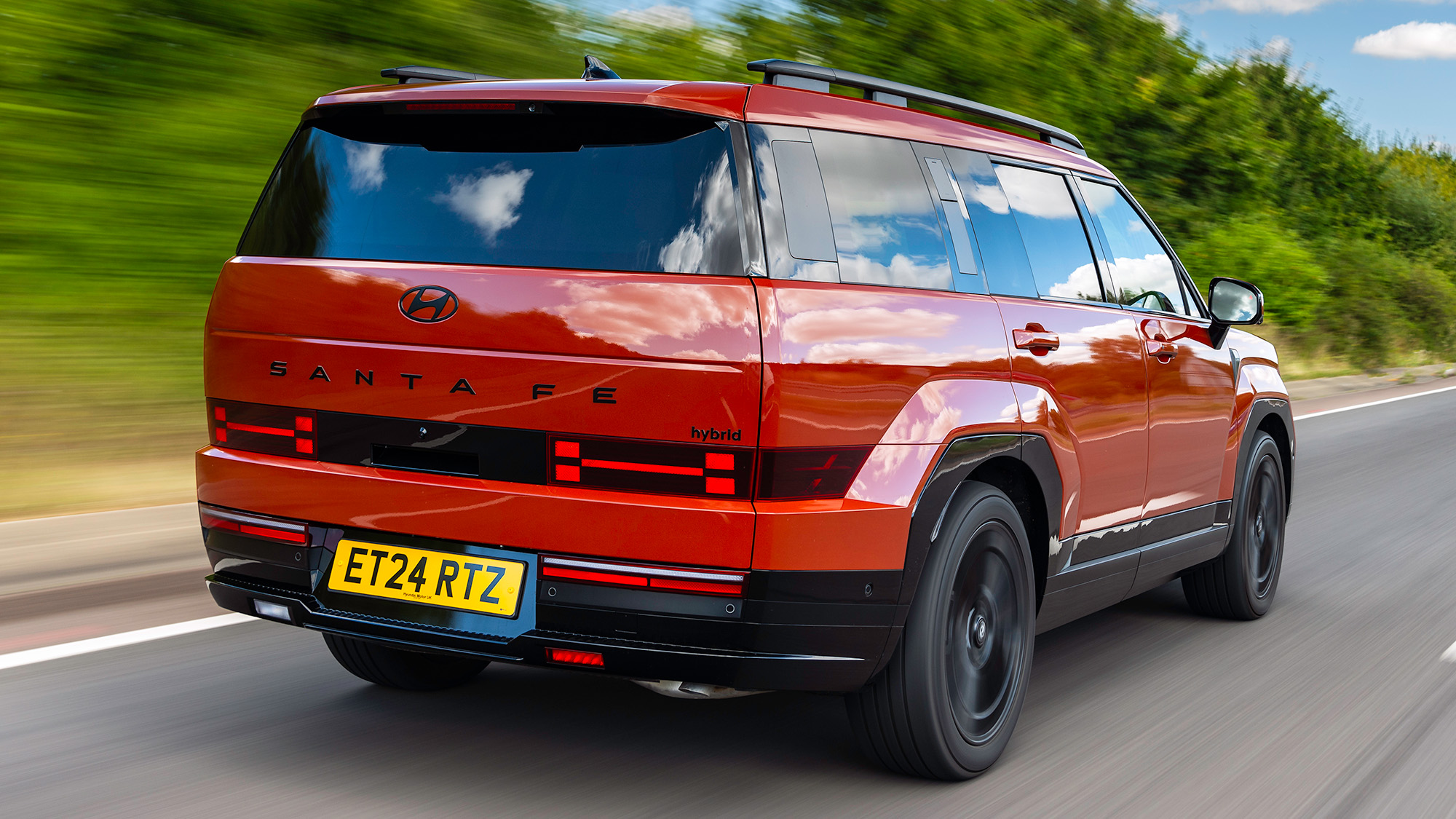
Best for: Those looking for a spacious, uniquely designed seven-seater
Pros: Distinctive boxy design, a spacious interior and practical features
Cons: The engine options might seem underpowered for such a sizable vehicle
If your family is growing, or you need to regularly haul about plenty of passengers, there are a handful of popular three-row plug-in hybrid choices out there. Options such as the Volvo XC90 Recharge, however, command a serious premium. Buyers not set on spending that much, but in need of seven seats, should instead take a look at the Hyundai Santa Fe.
The more affordable Hyundai, comparatively speaking, ticks a lot of key boxes; it’s spacious, packed with equipment, easy to drive, and relaxing to both own and be in. Its 13.8kWh battery also gives it the potential to cover up to 33.6 miles on electric power alone, although you’ll probably see more like 20 miles in real-world usage. If the big Hyundai’s not to your liking, though, take a look at the closely related Kia Sorento.
Read more about the latest Hyundai Santa Fe review
Ford Kuga Plug-in Hybrid SUV
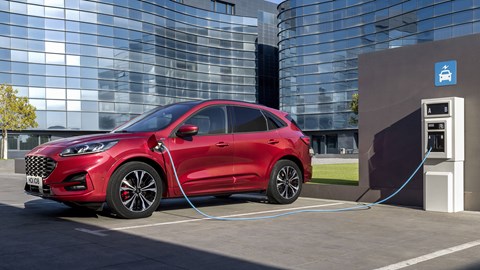
Best for: Those looking for driving pleasure with practicality and efficiency
Pros: Excellent handling, spacious interior, a range of hybrid options
Cons: Real-world fuel efficiency can vary significantly from official figures
Buying a plug-in hybrid SUV doesn’t have to be a one-way ticket to dullsville, as the Ford Kuga ably demonstrates. Primarily, thanks in part to Focus underpinnings, the Kuga handles remarkably well and is more enjoyable to drive than many a competitor. It also looks smart, features a practical interior, and comes with lots of equipment.
And, crucially, its 14.4kWh battery grants it an all-electric range of up to 40 miles. The Kuga’s admittedly not the punchiest thing around, though, with its 2.5-litre petrol engine and electric motor serving up a combined 222bhp. That grants a 0-62mph time of 9.1 seconds which, while not attention-grabbing, should prove more than adequate for daily duties.
Read the new Ford Kuga SUV review
What are the benefits of a plug-in hybrid?
Plug-in hybrid SUVs come with a myriad of benefits that make them an attractive choice for many drivers. One of the standout advantages is their impressive all-electric range. They allow you to complete your daily commute and short trips solely on electric power, which not only saves you money on fuel but also reduces your carbon footprint. It’s a win-win situation for both your wallet and the environment. Compare that to an all-electric SUV, where the efficiency is better, but the day-to-day experience may be more inconvenient.
Moreover, the beauty of plug-in hybrids lies in their versatility. When their battery is depleted, the internal combustion engine means you won’t have to deal with finding a charging point, waiting around or curtailing your trip.
Plug-in hybrids also offer reduced running costs, compared to their pure petrol or diesel alternatives, as well as the usual slew of benefits offered by substantial electrification – including silent and clean all-electric operation, which is ideal for urban areas.
Curtis Moldrich is the digital editor of CAR magazine, and has worked on the brand for six years. He’s driven every car in our electric car guides and driven many more hybrid and ICE cars too.